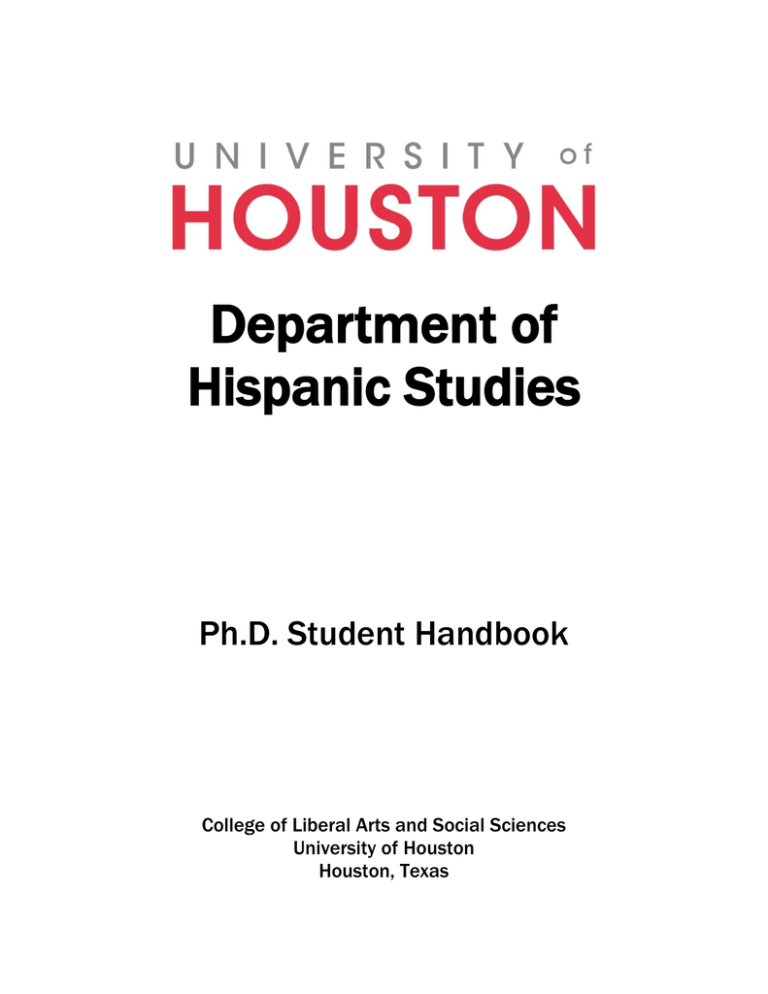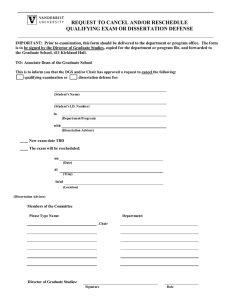Department of Hispanic Studies Ph.D. Student Handbook
advertisement

Department of Hispanic Studies Ph.D. Student Handbook College of Liberal Arts and Social Sciences University of Houston Houston, Texas MISSION STATEMENT The Department of Hispanic Studies seeks: To foster understanding and communication through the study of Spanish languages, literatures, linguistics and cultures in the age of globalization. To provide education and training for students seeking careers drawing on or enhanced by such study. To develop established and new programs contributing to local, regional, national and international knowledge. THIS MANUAL A MUST READ GUIDE FOR ACADEMIC AND ADMINISTRATIVE INFORMATION Welcome to de Department of Hispanic Studies at the University of Houston. We want to assure you start our program with all the information required in order to make your graduate experience the most successful possible. In this manual you will find both, administrative and academic information that will be crucial to start your process at UH. It is your responsibility to familiarize yourself with all the steps and procedures required to obtain and maintain good standing in our Department, as well as within UH at large. This is why we encourage all Graduate Students in the Hispanic Studies Department to go on-line to the University of Houston Graduate and Professional Studies catalogue and read all pertinent sections as soon as possible. You are responsible for knowing the content of this source. You should also visit with some frequency the site of the Graduate Advising in CLASS and explore Financial Assistant Opportunities. If you are a student who has been admitted conditionally, it is your responsibility file a petition for unconditional admission as soon as you have completed whatever the conditional status stipulates (e.g., they have been required to complete certain prerequisites, or to complete a stipulated number of hours with a grade of not less than B, or to post official GRE or TOEFL scores). 2 PH.D. IN SPANISH Students who enroll as doctoral candidates must complete their degree requirements within 10 years of the date of first enrollment with a doctoral degree objective. Failure to comply will result in the candidate being ineligible for that doctoral degree. TIME FRAME1 In general, graduate students are expected to be enrolled in consecutive long semesters (i.e. fall and spring semesters) until the degree program is completed and the degree is awarded. Students who cannot enroll in a given semester must apply for a leave of absence in order to remain in good standing (fill out a General Petition form and turn it in to the Graduate Director). ENROLLMENT AND REGISTRATION ENROLLMENT DURING THE LAST SEMESTER AND QUALIFYING EXAMS In the semester in which the student expects to graduate, they must submit an application for graduation to the Office of Registration and Academic Records, 108 E. Cullen. Deadlines for filing the application for graduation are listed in the Academic Calendar published in each semester’s Schedule of Classes and also in the Departmental one. Any student who expects to graduate in a given semester must be enrolled for that semester. Students must be enrolled for at least 3 hours of credits during the semester they expect to take the comprehensive examination, even if they have finished all course work (see the Graduate Director regarding appropriate courses in these cases), and they must continue to be enrolled through graduation. CONCENTRATIONS Before entering the Ph.D. Program the student should decide on a particular concentration for the Ph.D. in Spanish. Possible concentrations are: 3 Literature (includes US Hispanic, Peninsular, Spanish American) Spanish linguistics (includes Sociolinguistics, Applied Linguistics, Formal Linguistics). The student will take courses in three areas according to the concentration selected: 3 areas in literature 3 areas in linguistics 2 areas in literature and 1 in linguistics 2 areas in linguistics and 1 in literature. Courses syllabi will indicate the area or areas in which the course can be counted. COURSE REQUIREMENTS The Ph.D. in Spanish requires that beyond the achievement of the master’s degree, students complete a minimum of 36 semester hours of approved graduate courses [with a minimum grade of B- (2.67),] plus 6 semester hours of dissertation for the Ph.D. degree as follows: Linguistics Literature Required core courses 6 9 Elective courses 30 27 Dissertation 6_ 6_ 42 42 COURSE RECOMMENDATIONS The Department will, under normal circumstances, offer at least 8 different graduate courses every long semester to allow full time students to complete the 36 hours of course work in four long semesters. It will also offer several courses each summer (but in order to earn the Ph.D. degree the student must not plan to enroll only in summer). 4 Core courses Spanish 7301 (Methods of Study in U.S. Hispanic Literature and Language) Spanish 7393 (U.S. Spanish: Sociolinguistic Aspects) Spanish 7304 (Critical Theory). Elective courses Whenever possible, Ph.D. students must enroll in 7000-level courses as opposed to 6000-level ones. Exceptions must be authorized by the Graduate Director. The Graduate Director’s approval is also required in order for the student to enroll in courses offered by other departments or other universities. Grade requirement No course in which a grade below B- (2.67) is received will apply toward the degree. A minimum grade point average of 3.0 (B) for all graduate courses attempted is required in order to earn a graduate degree. Failure to maintain this average may result in warning, probation, or suspension. RESTRICTED ENROLLMENT COURSES Special Problems Courses (6198, 6298 and 6398). These courses allow the student to develop readings in a specific field of interest under the direction of a faculty member. The student and the professor will be required to complete in advance a special form (available from the Graduate Director) describing the course, which must then be approved by the Graduate Director. Since the department of Hispanic Studies offers eight or more graduate courses every semester, only academic justifications to conduct a Special Problem course will be approved (schedule problems of students are not considered academic justifications). Students will be allowed to take a maximum of six Special Problem hours, but only three of these may count toward the degree. Reading and Research Hours (7198, 7298 and 7398). These courses allow the student to develop readings and research in a specific field of interest under the direction of a faculty member. The grade option for these courses is S (satisfactory) or U (unsatisfactory). The student and the faculty member will be required to complete in advance a special form (available from the Graduate Director) describing the course, which must then be approved by the Graduate Director. Since the department of Hispanic Studies offers eight or more graduate courses every semester, only academic 5 justifications to conduct a Reading and Research course will be approved (schedule problems of students are not considered academic justifications). Students will be allowed to take a maximum of six Reading and Research hours, but only three of these may count toward the degree. PERFORMANCE Screening Procedure. At the end of each student's first year of course work at the Ph.D. level, a routine screening procedure will be conducted by all faculty members with whom the student has studied in order to determine whether the individual is progressing satisfactorily toward the degree objective. The result of this procedure will be communicated in writing to the student. EVALUATION PH.D. QUALIFYING EXAMINATIONS By the beginning of the semester at whose end the student wishes to take the Ph.D. Qualifying Examinations or at the beginning of the semester in which they will complete at least 36 hours, they should communicate this intention to both the chairperson of their committee and the Graduate Director. Students with incomplete grade(s) will not be allowed to take the Ph.D. Qualifying Examinations. The student will be examined according to the reading lists mentioned in the previous paragraph. Literature Track Ph.D. students of literature will be examined in one area of Hispanic Literature of the United States, one area of Latin American Literature and one area of Peninsular Literature. One of these three will be his/her main area. Ph.D. students of literature may substitute one of the second areas of literature with one area of linguistics. Linguistics Track Ph.D. students of linguistics will be examined in one area of Sociolinguistics, one area of Applied Linguistics and one area of Formal Linguistics. One of these three will be his/her main area. Ph.D. students of linguistics may substitute one of the second areas of linguistics with one area of literature. 6 STRUCTURE OF THE QUALIFYING EXAMINATIONS FOR LITERATURE AND LINGUISTIC TRACKS Main area: A paper to be developed in a two-week time frame or a five-day take-home exam. Second area 1: 2 hour and 30 minute exam. Second area 2: 2 hour and 30 minute exam. Oral exam: 1-2 hour oral exam consisting of a clarification of the written sections, which will be scheduled the week after the last written test. The dissertation proposal defense: it will be scheduled no later than the end of the semester. The Ph.D. Qualifying Exam will be scheduled during November and April; the oral component will be scheduled for the week following the last written exam. If the student fails the Qualifying Exams, they will have no more than one additional opportunity to retake either the whole exam or the portion/s failed. This must be done by the end of the following semester. PH.D. DISSERTATION DISSERTATION COMMITTEE The Dissertation Committee will be decided upon by the student and the prospective director of their dissertation (who will in most cases have been the chair of their examination committee) before or after s/he takes the Comprehensive Exam. This committee will be formed by two members within the field (at least one will be a senior professor), in addition to the Dissertation Director, who will also be a senior Spanish professor) and one external member. The Dissertation Director will aid the student in developing a dissertation on a topic in literature or linguistics that will be original and of scholarly value. The student’s dissertation proposal will be presented and discussed after the Comprehensive Exam but not later than the end of the semester. 7 DISSERTATION DEFENSE Once finished, the Ph.D. Dissertation will be defended before the Dissertation Committee by the candidate no earlier than the end of the second semester of dissertation hours. Additional faculty and students may be invited to attend the defense only if the candidate agrees to this following consultation with the Dissertation Director; however, only the Dissertation Committee members may ask questions of the candidate. Doctoral students who fail to complete their dissertation within five years after completion of the comprehensive examination must retake the examination. STUDY ABROAD OPPORTUNITIES The Department conducts summer programs abroad in both Mexico and Spain. Graduate students are encouraged to take advantage of them. The Department is proud to announce a special program conducted with the University of Salamanca, Spain, in which the student takes courses at that university during two consecutive summers, and may transfer (only if enrolled in this program) fifteen hour of course work to be counted toward the M.A. ADDITIONAL INFORMATION There is a graduate bulletin board in just outside the AH 432 where timely information is posted regularly. Important information of various kinds is routinely relayed to enrolled graduate students by e-mail. At the time of enrollment, if not before, be sure to turn in an e-mail address to the Graduate Director so that we may add you to the list. Important information of various kinds is routinely relayed to enrolled graduate students by email. At the time of enrollment, if not before, be sure to turn in an e-mail address to the Graduate Director so that we may add you to the list. If you have further questions please contact: Dr. Gabriela Baeza Ventura, Director of Graduate Studies, at gbventura@uh.edu or Dr. Paola Arboleda, Graduate Advisor, at parboeda@uh.edu 8 There are a few scholarships available for prospective and current graduate students. Competition for them is usually held in the Spring. Information about these is communicated by e-mail and also posted as soon as it is received. INTERDISCIPLINARY DOCTORAL DEGREE OPTION Departments granting Ph.D. degrees may, in individual cases, modify their Ph.D. course requirements to permit a larger share of course work to be pursued in another department. When course requirements are so modified, the primary or sponsoring Department should submit the following for the Dean’s approval: The design of the Ad Hoc Interdisciplinary Curriculum The names of the graduate faculty members in both the sponsoring and supporting departments who are responsible for directing the student through the curriculum and dissertation. A copy of the Dean’s written approval will then be forwarded to the Office of the Senior Vice President. Doctoral-level students interested in pursuing this option should talk to the Director of Graduate Studies in their primary department concerning possible modification of course requirements. According to the on-line University of Houston Bulletin of Graduate and Professional Studies, College of Liberal Arts and Social Sciences: For students pursuing the Ph.D. in Spanish who specifically request to this option, the curriculum may be modified as follows: Required core courses in Spanish 9 hours Courses in a specialization area of Spanish 15 hours Courses in a related field outside the Department 12 hours Dissertation in an area of Hispanic literature/linguistics 6 hours Total 42 hours The Ph.D. Qualifying Exam will consist of three three-hour exams related to the areas taken by the student (as noted above) and a two-hour oral exam. 9


